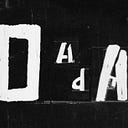An interview with Beatriz Ramos and Serena Stelitano.
By Anna Maistrelli
DADA.nyc was created as the first social network for collaborative visual conversations. It has now a rare digital art marketplace on the Ethereum blockchain. Beatriz Helena Ramos, the mastermind behind DADA, envisions a future where truly independent artists receive a passive income from the intangible value of their creations.
Back in 2005, when Beatriz was recruiting talents for her animation studio, she realized that there was a need for a database for artists to exhibit their works, but a mere database was not enough, she explains, because the artists matter just as much as their artworks. She envisioned a place that will revolutionize in some ways how artists interact with one another and with their art, so she started imagining how a social network for artists would look like:
“It had to be creative and visual. I was really thinking about communication visually and that is what drove all the decisions. We created a specific structure that moves forward”.
One of the key characteristics of DADA is the narrative created through artistic collaboration:
“DADA is not about the individual work. We want a space where everything is about cooperation and solidarity, which are amazing ways to allow self-expression, as well as constant inspiration. Additionally, we provide simple tools to encourage creativity, and erase intimidation.” Beatriz remembers that, after art school, the concern about the outcome of her art was so strong that she did not enjoy painting. Then she decided, very intentionally, to change her approach: “When I started painting for myself my art became better, I became a better artist and it became part of my life.”
Beatriz reveals she has a clear vision for DADA. “Most people in society, because of the way it is structured, don’t experience the joy of creating. Some artists, some scientists do, but most people don’t. So, for us the key questions are: how can we bring most people, not just artists, to enjoy art, the marvel of creation? And how can we make sure that artists can dedicate their life to creation, even if no one wants to buy their artworks?” It should not, she explains, be left to the market to decide the value of a piece of art because the value of art is intrinsic, not equal to its price.
On dada.nyc, the artworks will be sold in DADA tokens — DADA’s native cryptocurrency. One of the things that intrigue Beatriz about blockchain, besides facilitating the proof and transfer of ownership for digital art, is the possibility of creating a whole economy beyond the mere sale of the artwork. The platform is designed in such a way that artists that contribute to the ecosystem will receive a passive income without having to worry about the marketing or sale of their art. According to Ramos, “If artists don’t have to worry about providing for the most basic needs, they can make really independent decisions, professionally and personally: it’s beyond art, it’s about what you think it’s valuable in society, that society currently doesn’t value.”
“The idea behind DADA is not perfectible”: Serena Stelitano, known as Serste, explains DADA from the artist’s perspective.
Serena discovered DADA in 2014, and since then the priceless service it provides has made a real difference in her life as an artist. “I would definitely use DADA even if there was no economic incentive”, she continues: “DADA is not a showcase of an artist’s work. It is about collaboration and communication; the sale of the artworks is secondary.”
Serena likes to compare DADA artists to groups of impressionists: if Monet and Renoir were meeting in cafes or painting together en plein air. A couple of centuries on, DADA artists meet online from all around the world, paint digitally and can get to sell their artworks on blockchain.
“DADA is so innovative that it is sometimes seen with distrust by the traditionalists but the visual communication that can be experienced on DADA is on another level, and I hope that everyone will have a chance to give it a try at least once in their lives”, says Stelitano.
On the one hand, DADA is different from anything else, on the other, it is essentially something that humans, artists, do since prehistoric times: “it is demonstrated that the parietal paintings in Lascaux — the French decorated caves — are actually the result of the collaborative work done by prehistoric artists in the span of 2000 years. This is why the idea behind DADA is not perfectible.”
“For me as an artist, DADA is a place where I can communicate through my preferred channel, take a break from my life, and at the same time practice and enhance my art by collaborating with other amazing artists that I admire artistically and personally.”
For non-artists that want to start drawing, it is the perfect place to start. Serena remembers conversations where people were asking for drawing tips, to which artists replied with drawings-tutorials, including all the technical notes about their styles. “What makes it so fascinating”, explains Serena, “is that you will learn from different artists with completely different backgrounds and techniques, which is great for developing a personal style. It is like a tailor-made art course with five or six different super supportive teachers giving you all the advice. You cannot find it anywhere else”.
